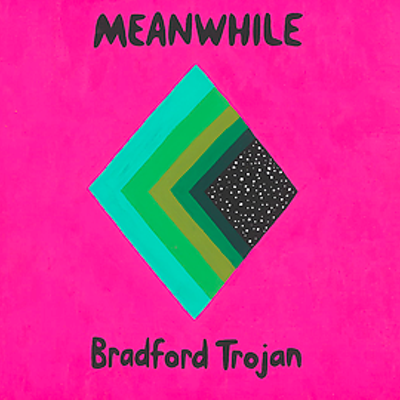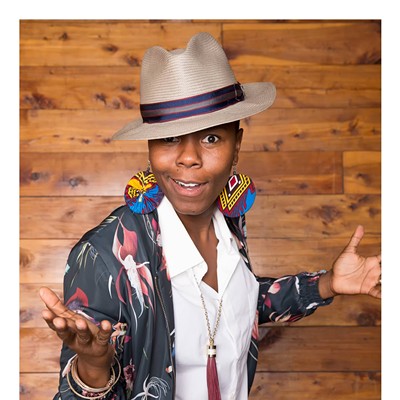When I get back home / I won't be / the same no more." These are the first words Dan Boeckner sings on Sound Kapital's buzzing opener "When I Get Back." Set against wife Alexei Perry's elephant-truck synthesizer blasts, the notice officially ushers in Handsome Furs' alluring, and most endearing, third release. The statement may read like innocence lost, but filtered through Boeckner's winsome delivery it becomes something celebratory.
Sound Kapital is full of ambiguous moments that meld the melancholy and the ecstatic. "Serve the People" is the band's first swaggering, bombastic anthem, and it is a triumphantly surging tune that also confronts scary truths ("diamonds and gold for the idiot sons / all the privileged thieves gonna make things run"). "What About Us?" is a tetchy number that turns lush and lovely as Boeckner imploringly bellows "I've been living life so long / I know there's nothing wrong with this / come on and break my heart." Meanwhile, album closer "No Feelings" is a sprawling, stunning work that manages to make its mantra—"I've got no feelings"—into a redemptive decree.
Initially, Handsome Furs emerged as a side project to Boeckner's Wolf Parade: a pared-down take on Wolf Parade's full-bodied anthems, made by Boeckner and Perry with guitars, synthesizers and drum machines. Now, with Wolf Parade on indefinite hiatus and Handsome Furs' recorded output matching Wolf Parade in quantity and quality, the term "side project" strikes a false chord. One of the most distinctive aspects about Handsome Furs is its decidedly political and worldly approach to music, from synthesizers that call to mind European discotheques to albums named after Helsinki grave-parks (Plague Park) or Russian nightclub policy (Face Control). Recently, during a phone conversation from a tour stop in Toronto, Boeckner spoke about Handsome Furs' lyrical preoccupations.
"I did that old adage of 'write what you know,'" Boeckner said. "I think if you write about something that you have genuine emotions about or you are genuinely interested in, it comes across better because you're being honest about the art you're making."
Much of Handsome Furs' lyrical content, however, has stemmed from the group's idiosyncratic touring route, which has taken them to places American rock bands rarely go, such as Russia and Asia. Sound Kapital is primarily influenced by the duo's recent and hugely inspirational Asian tours of China, Vietnam and Burma—featured on CNN's blog Indie Asia.
"It just so happens that we started touring internationally and traveling to these places that a lot of bands don't get to go to, and it became a huge source of artistic inspiration for us," Boeckner said. "I felt really positive coming into making this record. It was an expression of joy more than it was an expression of frustration and anger, which is where a lot of my records before came from."
The content of Sound Kapital is mostly plucked from the group's peregrinations.
"There's no real fictional accounts of anything on this record," Boeckner said. "Nothing like you sit in your room and make up some metaphors for being lonely and call it a song. It was more that we wrote about things we actually saw and experienced, and that felt really good."
This enthusiastic response to the people and locales explains the undercurrent of unfettered bliss coursing through even the more sinister musical moments on Sound Kapital. Talking to Boeckner, the influence of his travels cuts deeper than merely musical; he went as far as to state that Handsome Furs' Asian travels "really changed my life."
"I get more inspired by sitting around and talking to people I know in Belgrade now about local politics than I do sitting in my room trying to think about something to sing about," Boeckner admitted.
There is a kind of militant ferocity on the record, too, that is directly indebted to the young bands the group met in places like Myanmar, where an illegal show could have landed the local bands into hard-labor camps.
"When they decide to be in a band, they're deciding they're going to be slightly ostracized from society and that they're not going to make as much money as they would if they got a real job," Boeckner said. "They're totally committed, and it's not just economic, it's political."
Additionally, Boeckner and Perry found their consistent travels made composing on keyboards practical, which explains the swirls and washes of thick synthesizers throughout Sound Kapital. For Boeckner, he also wanted to challenge himself by composing away from his mainstay instrument, the guitar. Interestingly, the press release that accompanied the album led to a spate of reviews suggesting there are no guitars on the album. (Boeckner: "There's a lot of guitars on the album.")
"When you read a review, even if it's a positive review, you can definitely tell when a reviewer is scanning the bio and then taking shit verbatim out of the bio and putting it into the album review," Boeckner said. "It's kind of funny to me that people don't think the band would notice it. I just thought that was an interesting, Internet-specific phenomenon that happened with this record."
Lyrically and musically, Sound Kapital is wonderfully cohesive. The album's egalitarian ethics are nicely swept along by crisp production, which means even the punk-grumble of "Damage" or the fuzzy whines of "Cheap Music" sound big-hearted and wondrous. Similarly, the album cover, featuring a nude, tattooed woman striking a pose under a freeway overpass, is rooted in the band's generous spirit. The band was looking at footage director Scott Coffey had filmed for its "What About Us?" video when they saw what became the album cover.
"It summed up what we were trying to get at with this album: people we had met, making art and trying to be human in inhuman circumstances," Boeckner said, taking a moment before allowing for some levity. "Also, who doesn't like naked ladies?" he laughed.
Ultimately, Handsome Furs' travels have been constitutive to helping Boeckner understand the connection between making and playing music and connecting with humans, whether it's in Asia, Arizona, or all points in between.
"For me, playing music and getting to travel is ..." Boeckner said, trailing off. "I always think back to when I was telemarketing for a living. I don't complain about being on tour because I would rather be playing music for people in Philadelphia and have a day in Philadelphia than I would sitting in a telemarketing office. It just makes sense to me, so it feels like a really lucky job, and I don't really think there's anything to complain about."











